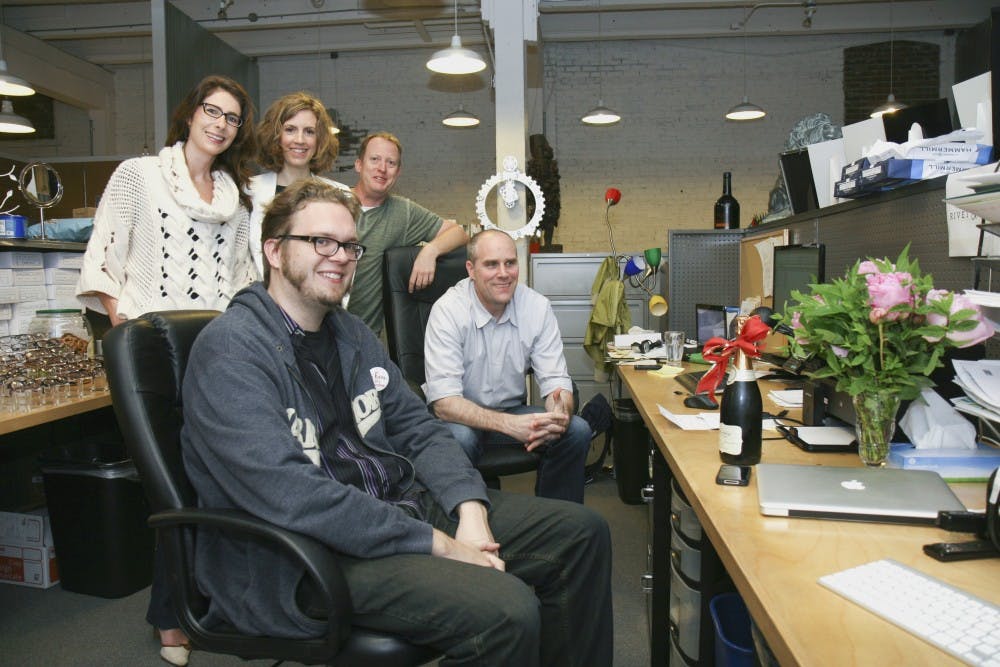
John Lusk (far right) sits with his team at Rivet & Sway in the company’s Seattle office. Rivet & Sway, which was founded recently, allows customers to buy boutique-style glasses from their homes.
Credit: unknownFrom selling novelty computer mice to playing semi-professional soccer to creating his own companies, John Lusk has experienced a roller coaster of success and failure as an entrepreneur.
When Lusk received his MBA from the Wharton School in 1999, he started a single-product company with fellow graduate Kyle Harrison that sold golf-themed computer mice, or “MouseDrivers.”
“During my second semester of business school, my roommate and I had to present an idea for a marketing class,” Lusk said. “MouseDrivers was that idea. The professor gave us $10,000 and challenged us to bring this thing to market. At the time, we thought it was the right decision.”
Eventually, however, MouseDrivers ended up being a bust, and Lusk and Harrison found themselves with a significant amount of credit card debt.
“We pushed them very hard to shoot for publicity, and even though that didn’t take hold, they ended up with a product that kind of did well but not spectacularly well,” said Ian MacMillan, who was the students’ professor and serves as director of the Sol C. Snider Entrepreneurial Research Center at Wharton. “That was a shame, because they deserved it.”
While some like Lusk have left entrepreneurship after an unsuccessful startup, it is rare for entrepreneurs to return to the industry after an extended period of time.
But today — more than a decade after his initial entrepreneurial venture — Lusk is back in the game, having recently founded online eyewear company Rivet & Sway, which specializes in eyewear for women.
Based in Seattle, Rivet & Sway allows consumers to shop for boutique-style glasses in their homes without losing the face-to-face interaction of shopping in stores.
Although the company specializes in women’s eyewear, it has attempted to distinguish itself from other competitors within the online eyewear industry, such as Warby Parker, which was also founded by four Wharton MBA graduates.
“We researched all the competition — including Warby Parker — and found that everyone going into this space was Warby Parker copycats, offering the same styles of frames and the same price point,” Lusk explained.
For College sophomore Alexis Richards, the ability to shop for glasses by face shape on the company’s website is very helpful.
“It ensure that the pairs you select to try on will suit you,” she said.
Looking back, Lusk attributes much of his passion to become an entrepreneur to his involvement with Wharton’s Small Business Development Center when he was a student.
“Because of that experience and interaction with professors there, I got to work with local entrepreneurs, whether it be the hoagie shop down the street or the tech company down in King of Prussia or the sports store in Center City,” he said.
“I remember him being incredibly determined,” MacMillan added of Lusk. “Obstinate people keep on trying things but in the same way over and over again. Perseverant people say it’s not working, but try again in a different way. I had to give him an A for perseverance.”
Lusk believes that much of this perseverance today was cemented after his initial — and unsuccessful — foray into the world of entrepreneurship with his MouseDriver company.
These early struggles were the subject of a book Lusk wrote, called “The MouseDriver Chronicles.”
Although the majority of his peers pursued traditional business jobs and opportunities in the dot-com world, Lusk and Harrison maintained their determination to start their MouseDriver company in San Francisco, even turning down job offers along the way. In order to remember their progress and struggles as young entrepreneurs, Lusk and Harrison consistently kept a journal, which eventually became part of the book.
“They turned it into something that became, in its own right, a way to generate a revenue stream,” MacMillan said. “Despite the fact that the product was less successful than they had hoped, they ended up with a pretty widely-read book. I thought that was admirable.”
The Daily Pennsylvanian is an independent, student-run newspaper. Please consider making a donation to support the coverage that shapes the University. Your generosity ensures a future of strong journalism at Penn.
DonatePlease note All comments are eligible for publication in The Daily Pennsylvanian.




